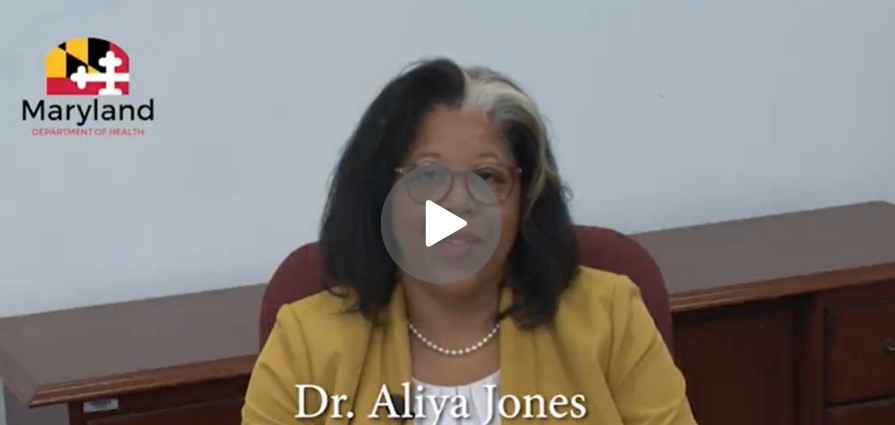
September 10, 2021
Media Contact:
Deidre McCabe, Director, Office of Communications, 410-767-3536
Charles Gischlar, Deputy Director, Office of Communications, 410-767-6491
Maryland Department of Health launches Suicide Prevention Toolkit
MDH highlights Suicide Prevention Awareness Month with new resources and reminders for people with thoughts of suicide
Baltimore, MD – The Maryland Department of Health (MDH) today announced the launch of a new resource to raise awareness about suicide for Suicide Prevention Awareness Month. The 2021 Suicide Prevention Month Toolkit: Stories of Hope focuses on raising awareness, reducing the stigma around suicide, spreading hope, building resiliency and encouraging well-informed action.

“The COVID-19 pandemic has been a collectively trying time for everyone, particularly people experiencing mental health or substance use problems, possibly combined with grief and loss, and other life uncertainties," said MDH Secretary Dennis R. Schrader. “Marylanders should understand it is important to talk about these issues, know how to recognize a crisis, and how to ask for help."
The new toolkit is called Stories of Hope because the materials feature information and calls to action about sharing stories of resiliency, which can normalize conversations about suicide while creating safe spaces for people to ask for help.
According to the National Institute of Mental Health, suicide was the tenth leading cause of death overall in the US in 2019, claiming the lives of over 47,500 people. Preliminary national data indicates an increase in suicides among all ages since the pandemic hit, including young people. According to the CDC, in May 2020 emergency department visits for suspected suicide attempts began to increase among adolescents (aged 12 to 17), especially girls. Suspected suicide attempt visits were 50.6% higher among girls during February to March 2021, compared to the same period in 2019; visits increased 3.7% among boys. In Maryland, preliminary suicide death data from the Maryland Office of the Chief Medical Examiner (OCME) shows an 18% increase in the total number of suicides within the state from 2019 to 2020.
Because more people — including young people — may be having thoughts of suicide or struggling in the wake of losing someone to suicide, MDH's Behavioral Health Administration (BHA) developed the 2021 Suicide Prevention Awareness Month Toolkit as a way to share information with stakeholders and the public. The toolkit includes sample social media messaging, a pledge to spread culturally informed and evidence-based suicide prevention strategies, information on BHA's Stories of Hope campaign, and fact sheets on related topics, including:
- Supporting People with Lived Experience
- Warning Signs of Suicide
- Risk Factors of Suicide
- Health Risk Factors of Suicide
- Protective Factors of Suicide
- Groups at Elevated Risk of Suicide
- R.A.C.E. for Suicide Prevention
- Lethal Means Safety
During the first two quarters of 2021, there was a sharp rise in the percentage of suicides by firearms in Maryland, up from 43% to 51% during the same time period in 2020, according to OCME. Maryland's growth in firearm sales is surpassed in only six other states. According to behavioral health officials, the overwhelming demand for guns in Maryland may lead to increased deaths by suicide, in addition to increased incidences of gun violence.
“Suicides are avoidable tragedies that we work tirelessly to prevent," said Dr. Aliya Jones, BHA Deputy Secretary. “Though the long-term effects of COVID cannot yet be fully understood, the pandemic has not hindered our efforts. We continue to develop new resources and remind Marylanders of the services that already exist to support them."
From the beginning of the pandemic, BHA has been reaching vulnerable populations through telehealth, working with behavioral health providers to identify gaps in service, and spreading awareness on suicide prevention and recovery efforts. BHA leaders developed a Student and Young Adult Resource Guide for Coping during COVID-19 with information and resources for young Marylanders. BHA also supports Maryland Essentials for Childhood's efforts to disseminate statewide a collection of trauma responsive materials and resources for parents of young children. Additionally, BHA's Office of Suicide Prevention has been sharing the toolkit with local jurisdictions and encouraging them to use the hashtag #StoriesofHope.
BHA is also raising suicide prevention awareness by:
- Sharing short videos on social media about stories of hope and resiliency
- Encouraging people to wear yellow for World Suicide Prevention Day and to check out the American Foundation on Suicide Prevention event (Sept. 10)
- Hosting a virtual fireside chat to support Maryland's service members, veterans, and families impacted by the current events in Afghanistan (Sept. 10)
- Hosting the 33rd Annual Suicide Prevention Conference for behavioral health professionals (Oct. 6)
- Offering multiple workforce trainings to behavioral health professionals; developing resources to support primary care providers who administer suicide risk screenings; and training clinicians in Assessing for Suicide in Kids
- Leading suicide prevention efforts for military service members, veterans and their families through the Governor's Challenge to Prevent Suicide Among Service Members, Veterans, and their Families
- Partnering with Psych Associates of Maryland to establish Operation Courage, a program providing crisis response to frontline workers
- Partnering with the Maryland Institute for Emergency Medical Services Systems to provide free mental health counseling to nursing home staff
- Partnering with Maryland State Department of Education through Project AWARE (Advancing Wellness and Resiliency in Education) to increase provider awareness on adverse childhood experiences and resilience, as well as facilitating Mental Health First Aid trainings
- Promoting awareness and use of BHA's mindresilience.org website
Download the Suicide Prevention Awareness Month 2021: Stories of Hope Toolkit.
People experiencing thoughts of suicide should contact Maryland's helpline by calling 211, and pressing one, texting 898-211, or visiting pressone.211md.org.
###
The Maryland Department of Health is dedicated to protecting and improving the health and safety of all Marylanders through disease prevention, access to care, quality management and community engagement.
Follow us at http://www.twitter.com/MDHealthDept and https://www.facebook.com/MDHealthDept.

